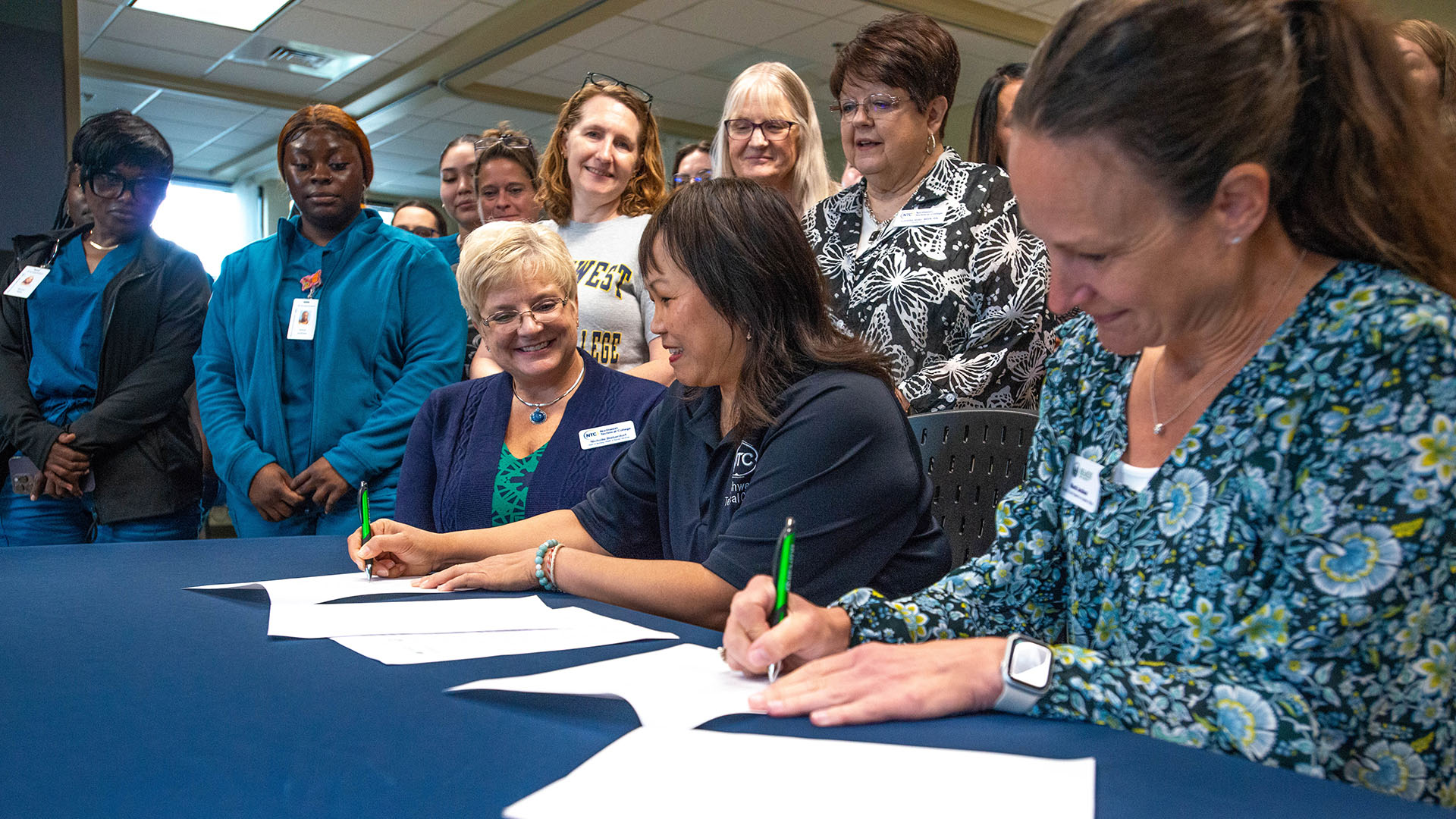Bemidji State University is helping address rural Minnesota’s need to grow its nursing workforce through Operation LEAD, a consortium that is expanding opportunities for nurses to quickly complete bachelor’s degrees.

Above: Northwest Technical College joined the Operation LEAD consortium on September 16, 2025. Seated, L to R: Nicholle Bieberdorf, NTC dean of allied health and BSU head nursing administrator, Dr. Ketmani Kouanchao, NTC executive vice president for academic affairs, and Dr. Marah Jacobson, BSU provost & vice president for academic affairs.
Operation LEAD — which creates a pathway for nursing students to “Learn to lead; Expand their knowledge; Advance their careers; and Discover new jobs” — began as a partnership between BSU and Minnesota North College, creating an automatic-admission and seamless transfer opportunity for the college’s graduates to join BSU’s bachelor’s degree program. It has since expanded to Northland Community & Technical College, Northwest Technical College — the most-recent member, joining during a Sept. 16 signing ceremony on its campus — and Pine Technical & Community College, which officially joined in early September.
In total, nursing students from the four participating colleges now have access to a pathway that will allow them to complete a bachelor’s degree at BSU in as little as one year. Two-year Operation LEAD nursing students gain guaranteed admission to BSU after earning their associate’s degree, and are guaranteed a spot in BSU’s RN-to-bachelor’s degree completion program.
Job opportunities for Minnesota nurses are projected to increase significantly in the next decade. According to Minnesota’s Department of Employment and Economic Development, registered nurses are the fourth-most in-demand profession in Minnesota. DEED projects more than 41,000 open positions in the next 10 years and more than 5 percent growth in the number of available jobs.
Bachelor’s degrees create opportunities for RNs to expand their careers and their salaries. The American Nursing Association says, on average, nurses with bachelor’s degrees earn about $17,000 more per year than nurses with associate’s degrees — which, over a 30-year career, means a bachelor’s degree is worth more than $500,000. A bachelor’s degree opens doors to jobs such as charge or travel nurses, case managers, directors of nursing or chief nursing officers, clinical research coordinators and more. Bachelor’s degrees also allow nurses to pursue specialized role in critical care, oncology, pediatrics and emergency medicine.
Operation LEAD was designed to help working professionals pursue these career-expansion opportunities, built around a flexible, accommodating schedule. Students have five opportunities each year to start courses which only last eight weeks each and are offered 100% online. Nurses also have the option to enroll part-time if that best fits their schedules.
Nursing students can begin working on bachelor’s degrees before completing their NCLEX — a national licensing examination for entry-level nurses. However, nurses who have passed the exam will receive 15 upper-division course credits through BSU’s RN Advantage program.
Other benefits include the opportunity to apply for one of 20 scholarships — either a $1,000 transfer scholarship, a $2,500 Minnesota Workforce Development Scholarship, or both — that are reserved specifically for Operation LEAD nursing students, opportunities to meet with BSU academic advisors and register for BSU courses on-site at their two-year college. Every Operation LEAD student also receives a personalized graduation plan, and BSU nursing graduates also complete Public Health Nurse Registration and End-of-Life Nursing Education Consortium certifications, in addition to a bachelor’s degree.
About BSU’s RN Advantage Program
Students who have earned an unencumbered Registered Nurse license receive up to 15 credits worth of progress toward the 3000- or 4000-level courses required for a nursing degree. With 40 upper-division credits required for graduation, the RN Advantage program gives licensed RNs significant recognition for their existing experience and shortens the time necessary for them to complete a bachelor’s degree.
Contacts
- Nicholle Bieberdorf, dean of allied health, Northwest Technical College, and senior nurse administrator, Bemidji State University
- Dan Voss, director of academic partnerships, Bemidji State University.
